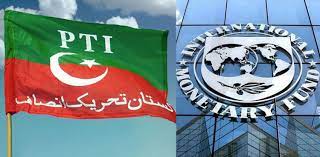
08-Mar-2024 , Updated on 3/9/2024 11:07:45 PM
Analyzing the IMF's Response to Imran Khan's Letter: A Closer Look at Pakistan's Economic Challenges
In recent years, Pakistan has been grappling with significant economic challenges, ranging from high inflation rates to mounting debt burdens. Amidst these pressing issues, Prime Minister Imran Khan's government has sought assistance from various international organizations, including the International Monetary Fund (IMF). However, the IMF's response to Khan's recent letter requesting financial support has sparked considerable debate and speculation about the future of Pakistan's economy.
In his letter to the IMF, Khan outlined Pakistan's economic predicament, emphasizing the need for immediate assistance to stabilize the country's finances. He highlighted the adverse effects of the COVID-19 pandemic, coupled with pre-existing structural weaknesses, which have exacerbated Pakistan's economic vulnerabilities. Khan's appeal for financial aid underscored the urgency of addressing Pakistan's fiscal imbalances and restoring macroeconomic stability.
In response to Khan's plea, the spokesperson of the IMF issued a carefully crafted statement, outlining the IMF's position and expectations regarding Pakistan's economic reform agenda. The IMF acknowledged Pakistan's challenges and expressed willingness to engage in constructive dialogue with the government to explore potential avenues for support. However, the IMF emphasized the importance of implementing comprehensive economic reforms to address underlying vulnerabilities and pave the way for sustainable growth.
One of the key concerns raised by the IMF was Pakistan's fiscal deficit, which remains alarmingly high despite government efforts to contain it. The IMF stressed the need for fiscal consolidation measures, including revenue enhancement and expenditure rationalization, to bring the deficit under control and create fiscal space for essential investments in infrastructure and social services. Additionally, the IMF called for measures to strengthen revenue administration and improve tax compliance to enhance revenue mobilization efforts effectively.
Furthermore, the IMF underscored the importance of structural reforms to address longstanding impediments to Pakistan's economic development. This includes improving the business environment, enhancing governance and transparency, and promoting private sector-led growth. The IMF emphasized the role of structural reforms in unlocking Pakistan's growth potential and attracting foreign investment, which is crucial for financing the country's external obligations and supporting sustainable development.
Moreover, the IMF highlighted the importance of monetary policy coordination to stabilize inflation and maintain price stability. Given Pakistan's persistent inflationary pressures, the IMF emphasized the need for a prudent monetary policy stance to anchor inflation expectations and preserve macroeconomic stability. This entails maintaining an appropriate policy rate, while ensuring effective communication and coordination between monetary and fiscal authorities to achieve common objectives.
In addition to macroeconomic stabilization efforts, the IMF emphasized the importance of social protection measures to mitigate the adverse impact of economic reforms on vulnerable segments of society. The IMF stressed the need for targeted social safety nets to protect the poor and vulnerable from the adverse effects of adjustment policies, ensuring that economic reforms are socially inclusive and equitable.
While the IMF's response to Imran Khan's letter signals a willingness to engage in dialogue and provide support, it also underscores the importance of ownership and commitment from the Pakistani government to implement necessary reforms. The IMF's assistance can complement Pakistan's domestic efforts to address economic challenges, but success ultimately depends on the government's ability to implement reforms effectively and sustain momentum over the long term.
In conclusion, the IMF's response to Imran Khan's letter highlights the complexity of Pakistan's economic challenges and the importance of coordinated efforts to address them. While the IMF stands ready to assist Pakistan in its reform efforts, the onus is on the government to demonstrate political will and commitment to implement necessary reforms. By pursuing a comprehensive reform agenda encompassing fiscal consolidation, structural reforms, and social protection measures, Pakistan can chart a path towards sustainable and inclusive economic growth.

Student
Join Our Newsletter
Subscribe to our newsletter to receive emails about new views posts, releases and updates.
Copyright 2010 - 2026 MindStick Software Pvt. Ltd. All Rights Reserved Privacy Policy | Terms & Conditions | Cookie Policy